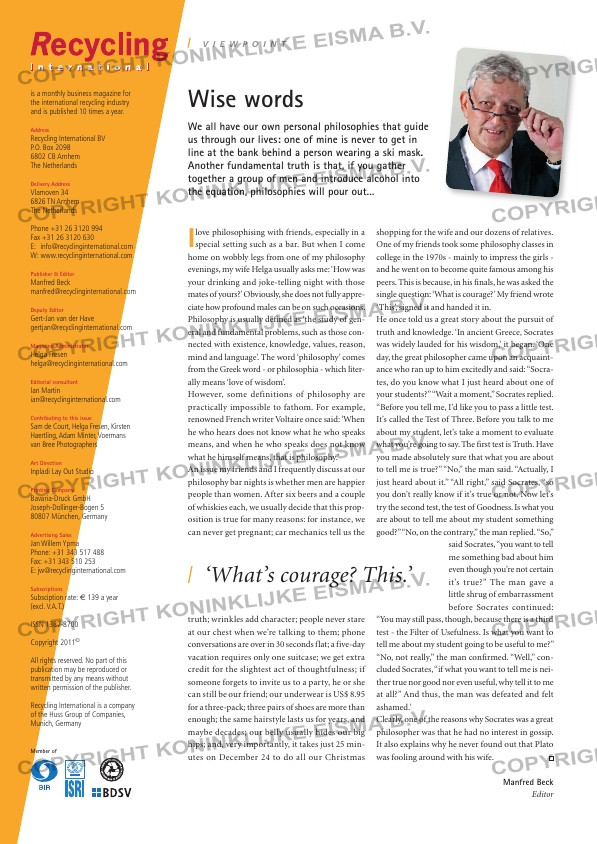Page 3 from: June / July 2011

V I E W P O I N T
Manfred Beck
Editor
I love philosophising with friends, especially in a special setting such as a bar. But when I come
home on wobbly legs from one of my philosophy
evenings, my wife Helga usually asks me: ‘How was
your drinking and joke-telling night with those
mates of yours?’ Obviously, she does not fully appre-
ciate how profound males can be on such occasions.
Philosophy is usually defined as ‘the study of gen-
eral and fundamental problems, such as those con-
nected with existence, knowledge, values, reason,
mind and language’. The word ‘philosophy’ comes
from the Greek word – or philosophia – which liter-
ally means ‘love of wisdom’.
However, some definitions of philosophy are
practically impossible to fathom. For example,
renowned French writer Voltaire once said: ‘When
he who hears does not know what he who speaks
means, and when he who speaks does not know
what he himself means, that is philosophy.’
An issue my friends and I frequently discuss at our
philosophy bar nights is whether men are happier
people than women. After six beers and a couple
of whiskies each, we usually decide that this prop-
osition is true for many reasons: for instance, we
can never get pregnant; car mechanics tell us the
truth; wrinkles add character; people never stare
at our chest when we’re talking to them; phone
conversations are over in 30 seconds flat; a five-day
vacation requires only one suitcase; we get extra
credit for the slightest act of thoughtfulness; if
someone forgets to invite us to a party, he or she
can still be our friend; our underwear is US$ 8.95
for a three-pack; three pairs of shoes are more than
enough; the same hairstyle lasts us for years, and
maybe decades; our belly usually hides our big
hips; and, very importantly, it takes just 25 min-
utes on December 24 to do all our Christmas
shopping for the wife and our dozens of relatives.
One of my friends took some philosophy classes in
college in the 1970s – mainly to impress the girls –
and he went on to become quite famous among his
peers. This is because, in his finals, he was asked the
single question: ‘What is courage?’ My friend wrote
‘This’, signed it and handed it in.
He once told us a great story about the pursuit of
truth and knowledge. ‘In ancient Greece, Socrates
was widely lauded for his wisdom,’ it began. ‘One
day, the great philosopher came upon an acquaint-
ance who ran up to him excitedly and said: “Socra-
tes, do you know what I just heard about one of
your students?” “Wait a moment,” Socrates replied.
“Before you tell me, I’d like you to pass a little test.
It’s called the Test of Three. Before you talk to me
about my student, let’s take a moment to evaluate
what you’re going to say. The first test is Truth. Have
you made absolutely sure that what you are about
to tell me is true?” “No,” the man said. “Actually, I
just heard about it.” “All right,” said Socrates, “so
you don’t really know if it’s true or not. Now let’s
try the second test, the test of Goodness. Is what you
are about to tell me about my student something
good?” “No, on the contrary,” the man replied. “So,”
said Socrates, “you want to tell
me something bad about him
even though you’re not certain
it’s true?” The man gave a
little shrug of embarrassment
before Socrates continued:
“You may still pass, though, because there is a third
test – the Filter of Usefulness. Is what you want to
tell me about my student going to be useful to me?”
“No, not really,” the man confirmed. “Well,” con-
cluded Socrates, “if what you want to tell me is nei-
ther true nor good nor even useful, why tell it to me
at all?” And thus, the man was defeated and felt
ashamed.’
Clearly, one of the reasons why Socrates was a great
philosopher was that he had no interest in gossip.
It also explains why he never found out that Plato
was fooling around with his wife.
We all have our own personal philosophies that guide
us through our lives: one of mine is never to get in
line at the bank behind a person wearing a ski mask.
Another fundamental truth is that, if you gather
together a group of men and introduce alcohol into
the equation, philosophies will pour out…
Wise words is a month ly busi ness mag a zine for the inter na tion al recy cling indus try
and is pub lished 10 times a year.
Address
Recycling International BV
P.O. Box 2098
6802 CB Arnhem
The Netherlands
Delivery Address
Vlamoven 34
6826 TN Arnhem
The Netherlands
Phone +31 26 3120 994
Fax +31 26 3120 630
E: info@recy clin gin ter na tion al.com
W: www.recy clin gin ter na tion al.com
Publisher & Editor
Manfred Beck
[email protected]
Deputy Editor
Gert-Jan van der Have
[email protected]
Magazine Administrator
Helga Fresen
[email protected]
Editorial con sul tant
Ian Martin
[email protected]
Contributing to this issue
Sam de Court, Helga Fresen, Kirsten
Haertling, Adam Minter, Voermans
van Bree Photographers
Art Direction
Inpladi Lay Out Studio
Printing Company
Bavaria-Druck GmbH
Joseph-Dollinger-Bogen 5
80807 München, Germany
Advertising Sales
Jan Willem Ypma
Phone: +31 343 517 488
Fax: +31 343 510 253
E: [email protected]
Subscriptions
Subsciption rate: e 139 a year
(excl. V.A.T.)
ISSN 1387-8700
Copyright 2011©
All rights reserved. No part of this
pub li ca tion may be repro duced or
trans mit ted by any means with out
writ ten per mis sion of the pub lish er.
Recycling International is a company
of the Huss Group of Companies,
Munich, Germany
Member of
‘What’s courage? This.’
003 o 3 15-06-11 16:50



